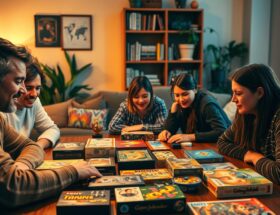Have you ever felt happy when you solve a tough puzzle? That feeling is your brain saying thanks. Mental exercise through puzzles and games is more than fun. It keeps your mind sharp and ready.
Rebecca Marcus, LCSW, says brain games are very important. They help us focus, remember things, and stay in the moment. They might even slow down brain aging.
Doing puzzles regularly makes new paths in your brain. Studies show that crosswords can help people with dementia. This shows how puzzles can really help.
Puzzles can make you better at solving problems and remembering things. They’re great for keeping your mind active as you get older. They make you smarter and happier.
Key Takeaways
- Brain games enhance focus, concentration, and memory capabilities
- Regular mental exercise creates and strengthens neural connections
- Puzzles may help slow age-related cognitive decline
- Different types of puzzles benefit specific cognitive skills
- Crossword puzzles show promise in delaying memory decline
- Consistent mental challenges contribute to overall brain health
The Science Behind Mental Exercise
When you do puzzles, your brain changes in amazing ways. Scientists are just starting to understand this. Solving puzzles rewires your brain and makes connections stronger.
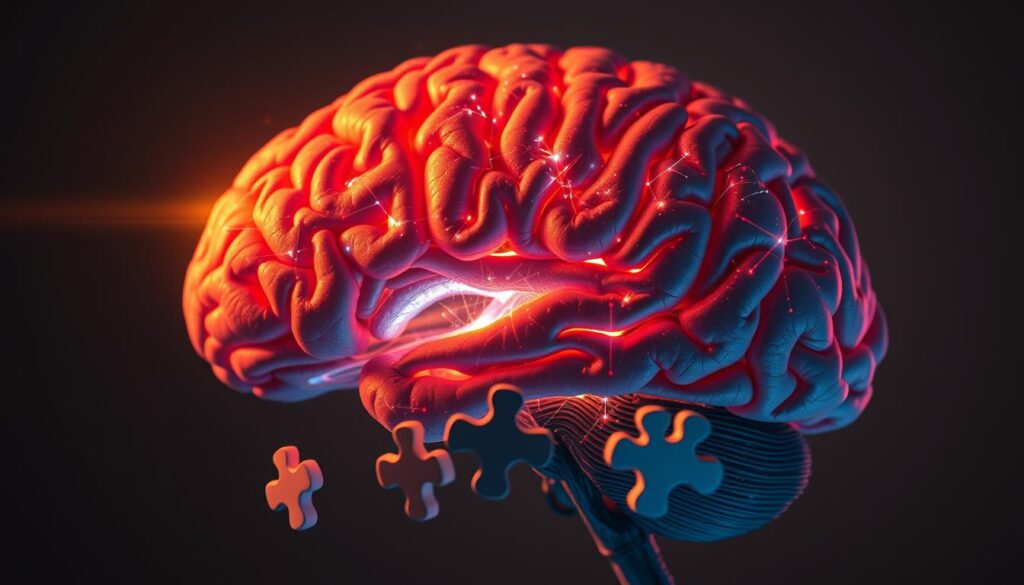
How Your Brain Responds to Cognitive Challenges
Your brain changes as you face new challenges. Different parts of your brain light up when you do puzzles. For example, crosswords work your language skills.
Spacial puzzles, on the other hand, work your visual and thinking skills.
This makes your brain strong in certain areas. But if you don’t use it, it can get weaker.
Think of puzzles as brain exercises. They help keep your brain sharp.
Challenging puzzles are better for your brain. They make you think harder and use more brain power.
Neuroplasticity and Puzzle-Solving
Neuroplasticity means your brain can change and grow new connections. This happens your whole life, not just when you’re young. Puzzles help your brain adapt and grow.
Learning new puzzles makes your brain stronger. It builds new paths and makes old ones stronger. This is why trying new puzzles is better than doing the same ones over and over.
Research on Cognitive Maintenance and Growth
Studies show puzzles are good for your brain. One study found crosswords might help prevent dementia. Puzzles are a key part of keeping your brain healthy.
Doing puzzles regularly builds a “cognitive reserve.” This reserve helps your brain stay sharp even as you get older. It gives your brain extra ways to solve problems.
Experts say puzzles are just part of the equation. You should also exercise and eat well to keep your brain healthy.
How Puzzle-Solving Keeps the Mind Sharp and Engaged
Puzzle-solving is like a mental gym. It works many brain functions at once. This keeps your brain sharp. Studies show that puzzles make adults think better than those who don’t solve them.
The Cognitive Skills Enhanced by Puzzles
Doing crosswords or jigsaw puzzles works many brain skills:
- Attention and concentration – focusing on what’s important
- Working memory – keeping information in mind briefly
- Processing speed – understanding and acting fast
- Problem-solving abilities – finding ways to solve problems
- Visual-spatial reasoning – seeing how things relate to each other
Different puzzles work on different skills. Sudoku helps with logic and patterns. Word puzzles improve your vocabulary. This makes your brain work better and faster.
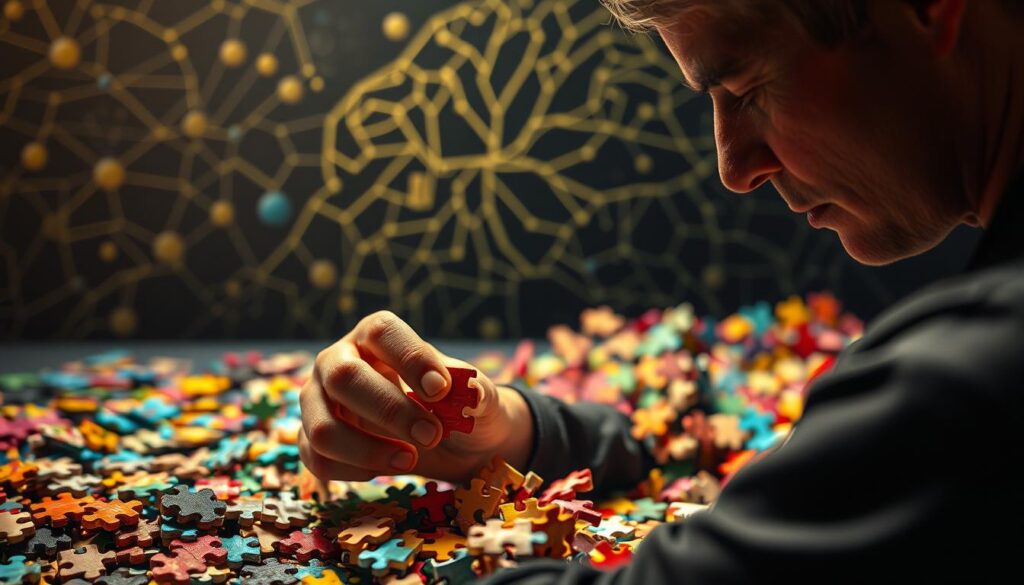
Short-Term vs. Long-Term Mental Benefits
Puzzles offer quick and lasting mental benefits:
- Improved focus and clear thinking
- Better mood and less stress
- Being more alert
With time, puzzles bring even more benefits:
“Working on puzzles strengthens brain connections, boosts mental speed, and is great for short-term memory.”
Long-term, puzzles make you think better and faster. Your brain gets better at learning and thinking quickly. This keeps your mind sharp for life.
Puzzles as Prevention Against Cognitive Decline
Puzzles also help prevent brain decline. Studies show they can slow down age-related brain changes. Older adults who solve puzzles have brains like those much younger.
This is because puzzles build “cognitive reserve.” It’s like a mental shield against brain aging. Each puzzle you solve adds to this reserve, helping protect against dementia.
The best way to use puzzles for brain training is to mix them up and make them harder. This keeps your brain growing and strong all your life.
Types of Puzzles and Their Unique Benefits
Puzzles are not all the same. Each type helps your brain in different ways. Knowing what puzzles do best can help you pick the right ones for your brain.
Word and Language Puzzles
Word puzzles are great for your language skills. They help you talk better and learn new words.
Crosswords and Vocabulary Building
Crossword puzzles help you learn new words. They make you think creatively and improve your memory.
People who do crosswords often have better vocabularies. They can talk more clearly and easily.
Word Search and Pattern Recognition
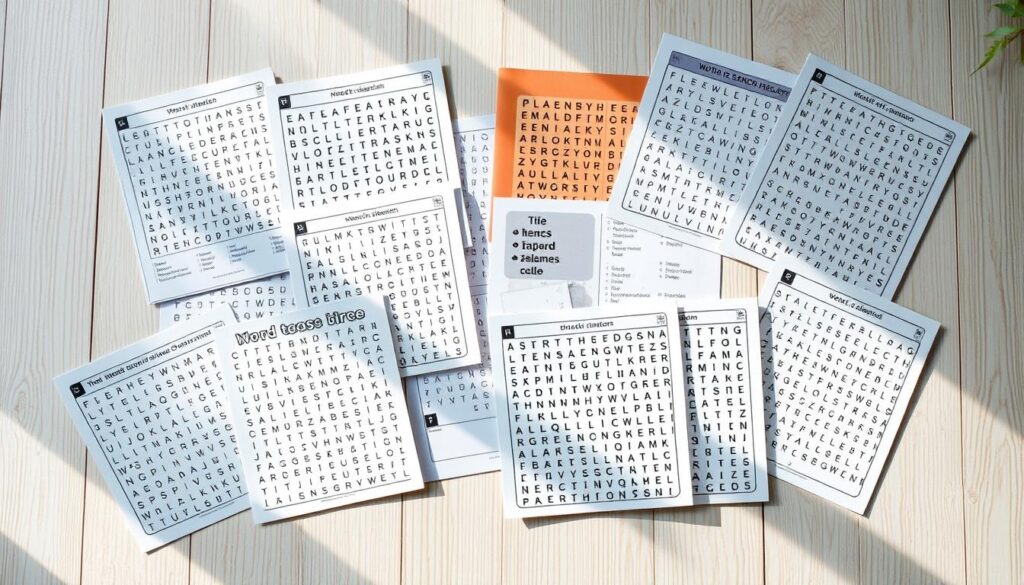
Word search puzzles are simple but helpful. They improve your eyesight and pattern recognition.
They also make you focus better and pay attention to details. This is good for learning new words.
Number and Logic Puzzles
Number and logic puzzles are great for thinking. They make your brain better at solving problems.
Sudoku and Logical Reasoning
Sudoku is a favorite puzzle for many. It tests your brain’s ability to solve problems.
Doing sudoku improves your memory and focus. It also helps you think more logically.
Math Puzzles and Analytical Thinking
Math puzzles are all about numbers. They make you think creatively and solve problems.
They help you understand numbers better. You also learn to keep trying until you get it right.
Visual and Spatial Puzzles
Visual puzzles are all about seeing and understanding. They make your brain better at visual tasks.
Jigsaw Puzzles and Spatial Awareness
Jigsaw puzzles are fun and good for your brain. They help you see and understand shapes better.
They also improve your ability to navigate and follow directions. This is useful in everyday life.
Tangrams and Creative Problem-Solving
Tangrams are ancient puzzles. They help you think creatively and solve problems.
They improve your ability to see and understand shapes. They also teach you to be patient and persistent.
Memory and Concentration Games
Memory puzzles are all about remembering things. They make your brain better at remembering.
Card Matching Games and Working Memory
Card games like “Concentration” improve your memory. They make you think and remember better.
Playing these games can help you remember names and places better. It’s useful in daily life.
Sequential Memory Challenges
Games that test your memory sequence are great. They improve your ability to remember and recognize patterns.
They also make you focus better and pay attention. This helps you follow instructions and remember things.
Modern Puzzle Experiences
Today’s puzzles are different. They mix old puzzle types with new ideas and teamwork.
Escape Rooms and Immersive Problem-Solving
Escape rooms are exciting. They combine puzzles in a fun way. You have to solve them to escape.
They make you think fast and work with others. They’re fun and good for your brain.
Mystery Boxes and Narrative Puzzles
Mystery boxes and puzzles tell stories. They make solving puzzles more fun. You get to follow a story as you solve it.
They make you think creatively and connect ideas. This is useful in many situations.
“Different types of puzzles exercise different cognitive muscles. Just as a well-rounded physical fitness routine includes various exercises, a complete mental fitness program should include many puzzle types.”
| Puzzle Type | Primary Cognitive Benefits | Secondary Benefits | Difficulty Progression |
|---|---|---|---|
| Crossword Puzzles | Vocabulary expansion, verbal reasoning | General knowledge, spelling skills | Easy to advanced based on clue complexity |
| Sudoku | Logical reasoning, pattern recognition | Concentration, working memory | 4×4 grids to 16×16 with added constraints |
| Jigsaw Puzzles | Visual-spatial reasoning, patience | Fine motor skills, systematic thinking | Fewer pieces to thousands of pieces |
| Memory Games | Working memory, attention | Visual recognition, information retention | Fewer items to remember to complex sequences |
| Escape Rooms | Multi-domain problem-solving, teamwork | Time management, stress tolerance | Beginner-friendly to expert-level challenges |
Emotional and Psychological Benefits of Puzzling
Puzzles are more than just brain games. They help us feel better emotionally and mentally. Sitting down with a puzzle can change how we feel and think.

Stress Reduction and Mindfulness Through Puzzles
Doing puzzles can make you feel less stressed. It’s like a mini-meditation. Your mind stops worrying about other things.
This calm feeling comes from focusing on the puzzle. It makes you stay in the moment. Studies show it lowers stress hormones, just like meditation.
“The meditative quality of puzzles allows the mind to enter a state of relaxed alertness, providing many of the same benefits as formal meditation without requiring specific training or technique.”
Even 15 minutes of puzzle time can help you feel better. You’ll feel calm and refreshed for hours.
Achievement and Self-Efficacy
Finishing a puzzle makes you feel good. It releases happy chemicals in your brain. This makes you feel proud of yourself.
Doing puzzles builds your confidence. It shows you can handle challenges. This confidence helps in other areas of life too.
Regular puzzle-solving makes you stronger. You face life’s problems with confidence and skill.
Flow States and Focused Attention
Have you ever lost track of time while doing something? That’s called a flow state. Puzzles are great for this because they’re just right for your skills.
In flow, you forget about yourself and focus only on the puzzle. It’s not just fun; it’s good for you. It can make you feel happier and more satisfied with life.
Puzzles also help you ignore distractions. This is useful in today’s world. It makes you more focused and calm all day.
Digital vs. Traditional Puzzles
The world of puzzles has changed a lot in recent years. Now, we have digital puzzles and old-school tactile puzzles. Both help your brain, but in different ways. Knowing the differences can help you pick the best puzzles for your brain.
The Rise of Brain Training Apps
Digital puzzles and apps have become very popular. Millions of people use their phones and tablets to solve puzzles. These apps are great because you can use them anywhere, anytime.
Apps have many good points:
- They get harder or easier based on how well you do
- You get feedback right away
- You can see how you’re doing over time
- They’re good for people who can’t do physical puzzles
Studies show apps can make your brain better. But, they can also make your eyes tired and less fun than real puzzles.
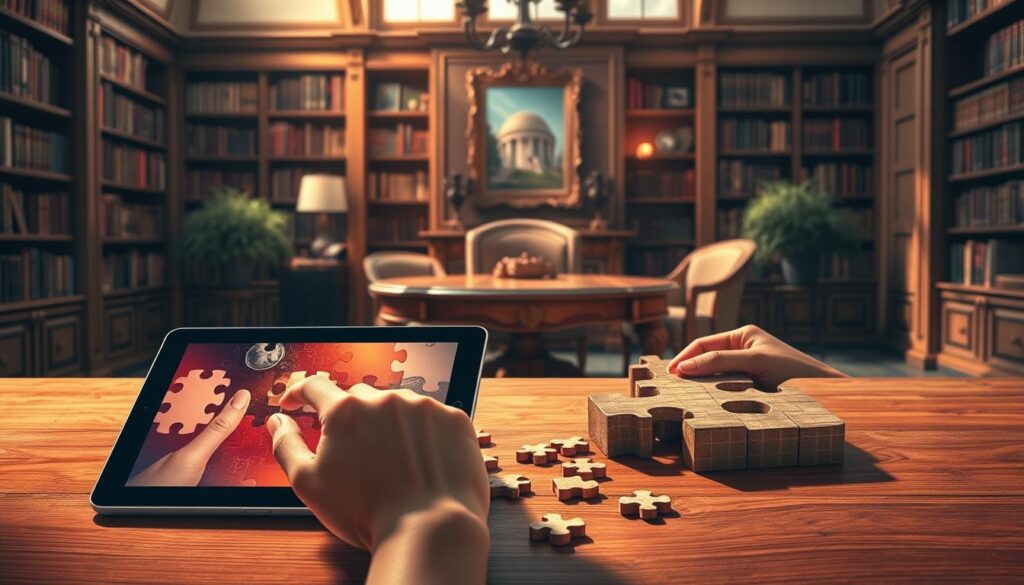
Benefits of Tactile Puzzle Experiences
Real puzzles give you a special feeling that apps can’t. When you touch puzzle pieces, your brain works in a special way. This is different from using a screen.
Real puzzles are good for many things:
- They make your hands stronger
- They help you think better about space
- They don’t hurt your eyes like screens do
- They help you focus better without digital distractions
Real puzzles are also great for relaxing at night. They don’t give off blue light like phones do. This helps you sleep better.
Finding the Right Balance for Your Cognitive Needs
It’s best to use both digital and real puzzles. Use apps when you’re in a hurry. Use real puzzles when you have more time.
Think about what you want to improve. Apps are good for quick thinking. Real puzzles are better for thinking about space and using your hands.
Changing puzzles often is good for your brain. It keeps your brain active in new ways. This can make your brain stronger than just one type of puzzle.
Choosing the Right Puzzles for Your Goals
Starting your journey to a sharper mind means picking puzzles that fit your needs. Not all puzzles work the same way. The best brain training happens when you pick puzzles that match your mind’s strengths.
Creating a puzzle routine that’s just right for you means knowing your mental strengths. It also means knowing where you need to get better. And picking puzzles that keep you interested and challenged over time.
Assessing Your Cognitive Strengths and Weaknesses
Before you start picking puzzles, do a simple self-check of your brain skills. Notice which tasks you find easy and which ones are hard. Do you get words quickly but struggle with shapes? Or are you good with numbers but find remembering things hard?
Free online tests can give you a clearer picture of your brain’s strengths and weaknesses. These tests check things like memory, focus, and problem-solving. Knowing this helps you pick puzzles that will really help your brain.
Remember, cognitive assessment isn’t about judging you. It’s about finding out what your brain needs to get better.
Matching Puzzles to Your Interests
The best puzzle routine is one you’ll keep up with. Choose puzzles that match your interests. If you love words, try crosswords or word games. History buffs might enjoy puzzles with historical themes.
Think about how puzzles fit with your hobbies and passions:
- Music lovers might enjoy rhythm games that improve pattern recognition
- Art fans could try jigsaw puzzles with famous paintings
- Science fans might like puzzles with scientific themes
“If you’re only doing the same thing over and over, your mind gets bored,” says Marcus. This is true for different puzzle types and matching puzzles with your interests.
Gradually Increasing Challenge Levels
The best puzzles are those that challenge you but don’t get you too frustrated. Start with puzzles that are just right, then make them harder as you get better. This keeps your brain growing without getting bored or giving up.
Watch for signs that a puzzle is too easy. If you solve it too fast or without thinking, it’s time to try something harder. Many puzzle systems have levels for beginners, intermediates, and experts, making it easy to get better.
| Puzzle Type | Cognitive Skills | Beginner Level | Intermediate Level | Advanced Level |
|---|---|---|---|---|
| Crosswords | Vocabulary, memory, reasoning | Simple clues, common words | More complex clues, specialized vocabulary | Cryptic clues, obscure references |
| Sudoku | Logic, pattern recognition | 9×9 grid with many given numbers | Fewer given numbers, moderate deduction | Minimal given numbers, complex strategies required |
| Jigsaw Puzzles | Visual processing, spatial reasoning | 100-300 pieces, distinct colors | 500-1000 pieces, more detailed images | 1000+ pieces, subtle color variations, challenging patterns |
| Logic Problems | Deductive reasoning, systematic thinking | Few variables, straightforward clues | Multiple variables, indirect relationships | Complex systems, multi-step deductions required |
By carefully choosing puzzles that match your brain’s needs, you create a routine that’s both fun and effective. This way, solving puzzles becomes a purposeful way to improve your mind.
Puzzles for Different Age Groups
As we grow, our brains need puzzles that match our age. A puzzle for a kid won’t be the same for a senior. It’s important to pick puzzles that fit our current brain goals.
Children: Building Foundational Cognitive Skills
Children’s puzzles help build important skills for learning. Simple puzzles improve fine motor skills and hand-eye coordination. They also help with visual skills needed for reading.
Children’s puzzles should get harder as they grow. Toddlers start with big, easy puzzles. Older kids can do harder puzzles and games. These puzzles help kids solve problems and keep trying.
Young Adults: Maintaining Mental Agility
Young adults need puzzles that help with multitasking and thinking creatively. Fast puzzle games keep their brains sharp during busy times.
Games like strategy puzzles and escape rooms are great for young adults. They’re fun and help keep the mind active. Many use puzzle apps to fit in brain training.
Middle-Aged Adults: Combating Mental Fatigue
As we get older, puzzles help fight mental tiredness. They improve speed and memory, which change in middle age.
Games like crosswords and sudoku are good for middle-aged adults. They keep the mind sharp and give a break from work.
Seniors: Preserving Cognitive Function
Seniors use puzzles to stay sharp and independent. Senior puzzles help keep memory and thinking skills strong.
Large-piece puzzles and word games are great for seniors. They also enjoy puzzle groups for social fun. Solving puzzles makes them feel good and keeps their minds active.
| Age Group | Cognitive Priorities | Recommended Puzzles | Benefits |
|---|---|---|---|
| Children (3-12) | Foundation building | Shape sorters, simple jigsaws, pattern blocks | Spatial awareness, pattern recognition, persistence |
| Young Adults (18-35) | Mental agility | Strategy games, escape rooms, logic puzzles | Multitasking, creative problem-solving, stress relief |
| Middle-Aged (36-65) | Cognitive maintenance | Crosswords, sudoku, strategic board games | Working memory, processing speed, mental reserve |
| Seniors (65+) | Preservation | Large-piece jigsaws, word games, memory matching | Memory retention, attention, independence |
Overcoming Puzzle Challenges and Frustration
When you face a tough puzzle, how you react is key. Puzzle-solving has ups and downs. You’ll hit times when you feel stuck and puzzle frustration kicks in. But these tough spots are chances to grow your mind.
Strategies for When You’re Stuck
When you hit a puzzle wall, don’t give up. Use problem-solving strategies instead. Taking breaks can help. Your brain works on it while you’re away, and you might get a breakthrough later.
Break big puzzles into smaller parts. This makes them easier to handle. Work on one section at a time, not the whole puzzle.
Looking at puzzles from different angles can help. Try seeing it from another side or sorting pieces by color. If you’re really stuck, hints can help without taking away the fun of solving it yourself.
Learning from Mistakes and Failures
Every mistake in a puzzle is a chance to learn. These failures make your brain stronger. Your brain remembers challenges better than easy wins.
Struggling a bit with puzzles is good for your brain. It makes your brain more flexible. This helps you solve problems in real life too.
Perseverance helps you grow mentally. Keep trying, even when it’s hard. Celebrate small wins and find puzzles that match your skill level. The best puzzles are the ones that seem impossible at first.
Incorporating Puzzles Into Your Daily Routine
Adding puzzles to your daily life is a great way to keep your mind sharp. Puzzle expert Marcus says, “Just like we need to exercise our bodies, we need to exercise our minds.” Let’s see how to make daily mental exercise a part of your day.
Creating a Sustainable Puzzle Habit
To make puzzle habits last, integrate them into your daily life. Don’t just add puzzles to your list. Try solving a crossword with your coffee or a logic puzzle at lunch.
Keep puzzle books or apps where you can see them. Even short puzzle sessions can help. Being consistent is more important than how long you puzzle.
Social Puzzling: Making It a Group Activity
Social puzzling makes puzzles more fun and beneficial. Host puzzle nights with friends or family. You can play jigsaw puzzles, escape room games, or word games together.
Join or start a puzzle club in your area. Many libraries and centers have puzzle events. These events are great for socializing and exercising your brain.
Tracking Your Progress and Cognitive Improvements
Tracking your puzzle progress can motivate you. Keep a journal of your puzzle times and how you felt. Digital platforms can also track your progress.
Notice how puzzles help you in real life. Do you focus better in meetings or remember names easier? Celebrate these small wins to keep up your mental fitness.
Conclusion: Building a Sharper Mind One Puzzle at a Time
Your journey to better cognitive health is easy. You don’t need fancy gear or hard plans. Simple puzzles can make your mind sharp and fit into your day.
Puzzles are good for your brain. They make your brain connections strong. You can try crosswords, sudoku, or jigsaw puzzles to keep your mind sharp.
Puzzles do more than just help your brain. They make you feel less stressed and more confident. Sharing puzzles with friends can also make you feel connected.
Begin with puzzles that you like and can do. As you get better, try harder ones. Even a little bit of puzzle time each day is good for your brain.
Adding puzzles to your life is a smart choice. It’s as important as eating well, moving, and sleeping. Puzzles help keep your mind sharp for life.
Your sharper, more active mind is waiting. Just start with one puzzle at a time.


